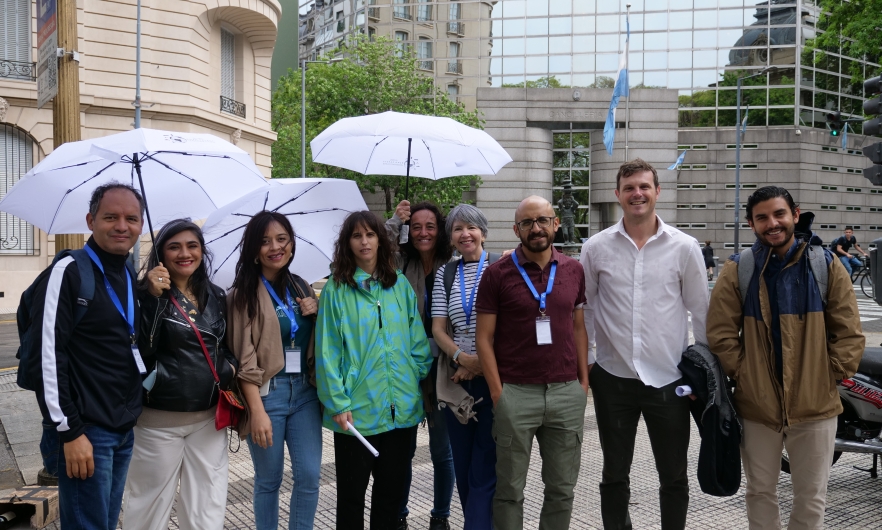JH-IIRU and GRSP Lead Back-to-Back Road Safety Courses in Argentina

A RSELC 2023 group poses for a picture mid-walking tour in Buenos Aires, Argentina
From November 5 – 18, 2023, the Johns Hopkins International Injury Research Unit (JH-IIRU) and the Global Road Safety Partnership (GRSP) hosted a range of road safety professionals and road policing leaders in Buenos Aires, Argentina, for the first iteration of the Road Safety Executive Leadership Course (RSELC) and the second iteration of the Road Policing Executive Leadership Course (RPELC).
Both courses fall under the Global Road Safety Leadership Course (GRSLC) suite of courses supported by the Bloomberg Philanthropies Initiative for Global Road Safety (BIGRS).
Twenty-seven road safety leaders from five countries—Argentina, Mexico, Colombia, Brazil, and Ecuador—participated in the RSELC and engaged in interactive sessions geared to enhance their competencies in leading change to enhance road safety, information sharing, brainstorming, and establishing effective collaboration.
Experts from JH-IIRU and GRSP facilitated various sessions, with external speakers joining in throughout the week. Invited facilitators included global experts and leaders from within the region such as Ricardo Pérez Núñez from the Pan American Health Organization (PAHO), Adriana Jakovcevic from the World Resources Institute (WRI) Brazil, Veronica Raffo from the World Bank, and Roberto Cláudio Rodrigues, former mayor of the Brazilian city of Fortaleza.
The course was designed and implemented with the Latin American context in mind to enhance the participants’ capacity in evidence-based approaches, decision-making processes relating to policy and program implementation, multisectoral collaboration, effective resource utilization, and data collection and use.
Additionally, the RSELC included a walking tour led by officials from the city of Buenos Aires and staff from WRI. The facilitators and the participants explored three different bike paths and discussed surrounding infrastructure from the safe systems perspective to make roads safe for all road users.
“The course gave me plenty of ideas to implement in my city. It gave me plenty of ideas to boost the steps we have been taking to strengthen road safety and safe mobility,” explained Karina, Metropolitan Director of Active Mobility of the Ecuador’s Ministry of Mobility.
On the other hand, the RPELC welcomed 33 road policing leaders from Latin America for a week of discussions and sessions on procedural justice, effective road policing leadership and integration, tasking and coordination, and intelligence-led policing. The sessions were facilitated by GRSP’s Road Policing Capacity Building team, with the help of the International Association of Chiefs of Police (IACP) and Edgar Zamora from the International Road Assessment Programme (IRAP).
With the support of the Body of Traffic Agents of Buenos Aires, the attendees also participated in a series of hands-on activities. They analyzed and explored crash and braking distance scenarios and speed, drink driving, and motorcycle checkpoints.
“The RPELC will be very useful for our work, not just for me as a participant of the course, but for the traffic officers of Buenos Aires. Gaining knowledge of the Safe Systems approach helps us grow as an organization; it helps us continue to be on the path of professional road safety and mobility,” shared Leo, General Coordinator of the Body of Traffic Agents at the Urban Mobility Monitoring and Management Center of Buenos Aires.
The JH-IIRU and GRSP teams are grateful to Bloomberg Philanthropies and BIGRS partners for their immense support in the back-to-back delivery of the courses. Moreover, we wholeheartedly congratulate every RSELC and RPELC 2023 graduate and thank them for their constant engagement and dedication throughout the days of intense learning in Argentina.
-
Find more content on the courses using these hashtags: #RSELC2023 and #RPELC2023.
